Table of Contents
ToggleLong before she was born, I asked the universe for a sister.
I didn’t ask for colorful toys.
I didn’t ask for snacks or sweets.
Not even for food on the days my belly growled.
I was a quiet child. I never asked for anything — because I already knew we didn’t have much to begin with. Even at three, I understood the weight that clung to our household like a second skin: illness, silence, sacrifice. But somehow, beneath it all, I knew there was a missing part of me.
And the only thing I wished for was a little sister — as if my soul remembered someone I hadn’t yet met.
My mother tells me it was relentless. From the moment I could speak, I begged for a sister.
I told her that if the baby was a boy, we’d leave him by the road for a fox to take him home.
She recalls the deadly seriousness in my eyes — enough to make her fear giving birth to another boy.
I wanted a sister or nothing at all.
What my mother didn’t tell me until much later is that having another child could’ve cost her life. After she gave birth to me, her heart condition worsened. The doctors told her never to try again — that another pregnancy could end her life.
But I was too young to know.
So I wore her down — not with tantrums, but with loving devotion.
Every day, I’d press my tiny ear to her belly, trying to hear the heartbeat of the one I already knew was coming.
And then she arrived — like a festival.
The whole village said she was a rose from a divine garden. Chubby rosy cheeks, curled lashes, skin like honey and milk. Even as a baby, she had fire in her eyes and thunder in her breath.
I was four years old, and the day my mother placed her in my arms, my heart sang in ecstasy and the world stood still.
I didn’t yet have the language for unconditional love — but I knew I was holding its very possibility, as I held her.
When her wandering eyes stopped and met mine for the first time, something in me whispered: You were born to protect her.
The dam of my little heart burst — and tears rushed out like a river set free.
I knew nothing yet of the yin and yang of life, but I already felt how darkness retreats in the presence of the light of my new born sister.
So I named her Lux — the light that found me, the light of my life.
No explanations were necessary.
I knew — she was the reason.
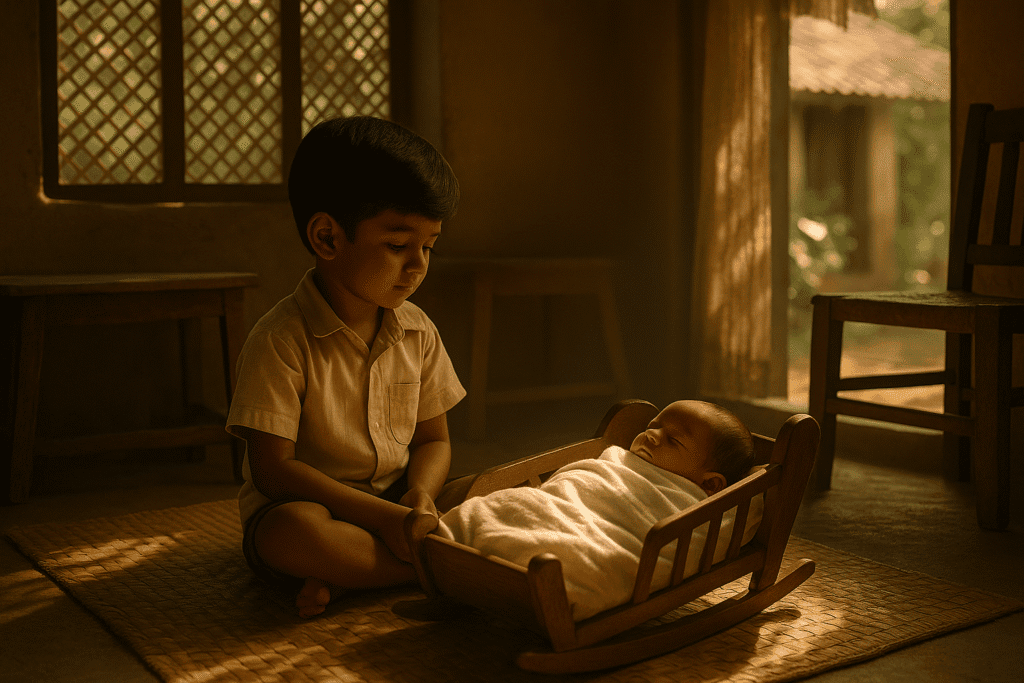
It wasn’t long after that when something seemingly insignificant tilted my world for the first time. Among the few cherished memories I carry from childhood, this one was terrifying.
We lived in a modest house with a wet kitchen out back.
I was born a storyteller. I sat on the door steps, supposedly reading stories to my mother and sister from an old book — though I could barely write my name yet.
My mother was washing dishes, her back turned to the stroller where my baby sister lay — only a few months old, wrapped in sleep.
Then it happened.
The joints of the stroller — old, heavy, rusted iron — snapped.
The entire frame buckled, and the stroller collapsed inward like a crushed cage.
In that moment, my heart shattered — without warning or sound.
I don’t remember thinking. I jumped down the steps, faster than breath — my body moved before my mind knew why.
I reached her in a single step, tore the tangled frame apart with shaking hands, and scooped her out with both my arms.
She looked at me — not with fear — but with a soft chuckle, those expressive, curious eyes blinking as if she was still half-lost in a dream.
Unaware that the world had just nearly ended in my reality.
I held her against my chest — so precious.
But I was still trembling.
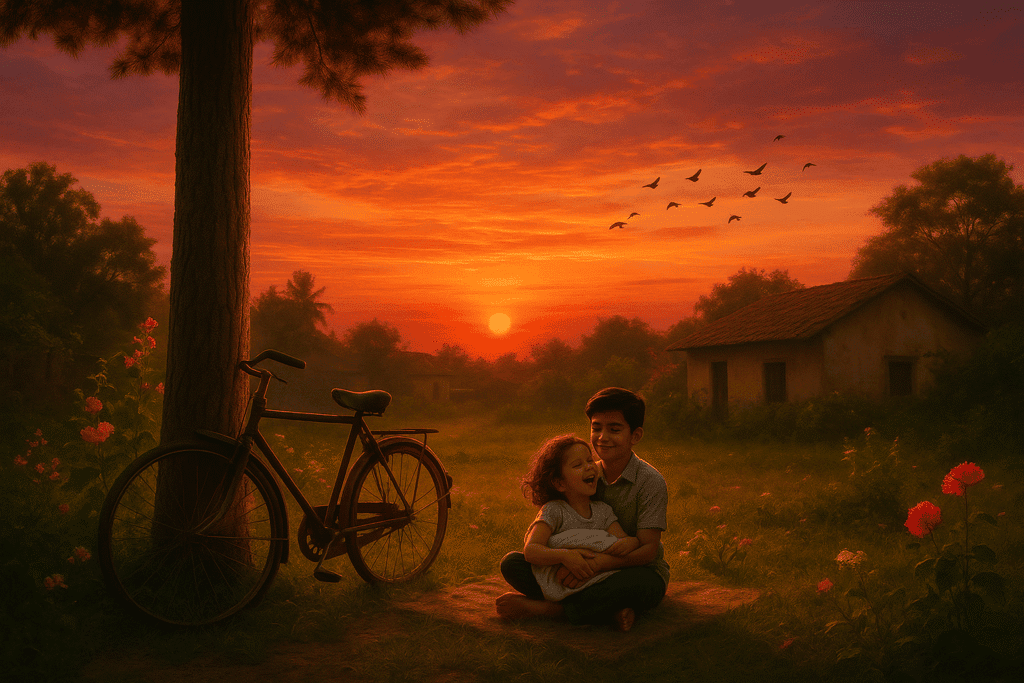
The body remembers what the soul once promised. It’s the kind of love you don’t fall into — you awaken to it, already inside you.
The stories that held us when no one else could
There were many nights when the house felt too lonely, too heavy, to fall asleep.
Between my mother’s illness, the unpredictability of her moods, our father’s night shifts, and the kind of silence that crept through the walls like ghosts — I learned early that comfort wasn’t something you waited for.
It was something you had to find yourself.
As a little baby, my sister was afraid to sleep alone.
She would curl up beside me, seeking comfort — and the only resource I had in my tiny power was storytelling. Not from books, but from something I seemed to be born with: my imagination.
I made up tales of talking animals, of stars that whispered secrets. Of children who found treasure hidden inside their hearts.
Listening to the stories, her little fingertips would draw slow shapes and quiet lines across my back — soothing me, as if she was holding onto the thread of my presence, making sure I didn’t disappear with the very stories I was telling.
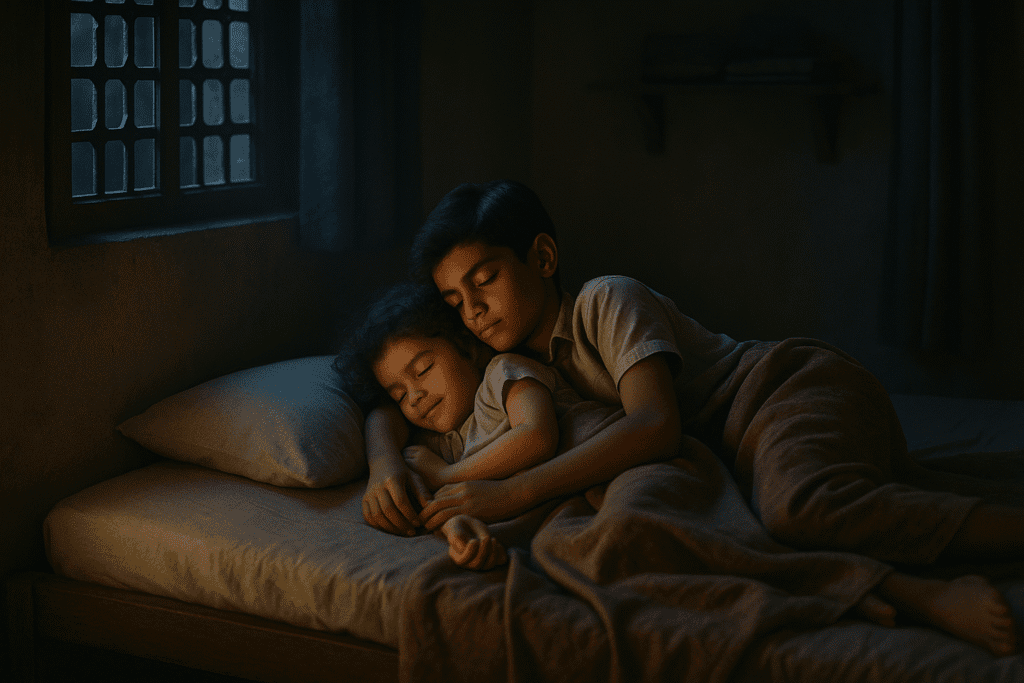
Her eyelids would flutter, her breath softening as the story carried her across that invisible bridge into sleep.
Only then would I wrap my arms around her, pull her to my chest, and let myself drift too.
Even in sleep, I never fully let go.
A quiet vigilance lived beneath my ribs — I was standing guard, even in my dreams.
Looking back, I understand it now: I was filling a gap — not just of a mother, but of a father too. Not because they didn’t love us, but because they were carrying more than they could – including the shadows of their past.
It’s strange how nurturing bloomed in me, not from what I had, but from what I longed for.
We didn’t have lullabies.
We had stories whispered in the dark by a boy pretending not to be afraid.
And somehow, those stories kept us alive.
How my spine learned to carry more than my body
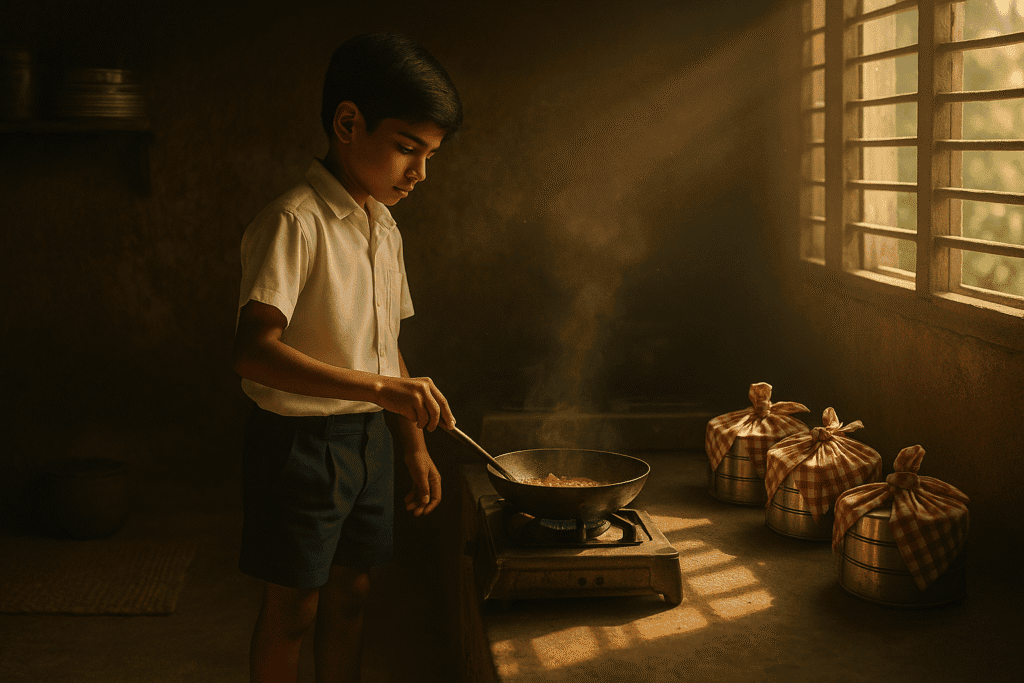
The sky was soft with golden rays, shining through dew drops on the leaves of sleepy trees. The birds were already singing their stories to the world. I was buttoning my white school shirt, humming along, smiling at my own reflection in the mirror. I loved the magic of mornings — a new light, a new promise, every single day.
Then a sudden crash — metal on cement and a heavy thud that followed.
Then — silence.
The kind that stops everything inside you.
The kind that sends shockwaves of panic through your body.
I ran to the kitchen.
My mother had collapsed. She was unconscious on the floor, her body twisted beneath her, and beside her was a large iron pan — tipped over — the boiling oil now burning into the flesh of her thighs and down her legs.
The air smelled of smoke and something sharp — panic, maybe.
She wasn’t moving.
I froze. My knees buckled.
It felt like I couldn’t breathe, like the air was sucked out of the atmosphere.
The only thing that moved were my fingers — trembling.
Then my father came running, scraping my mother into his arms and rushing out of the door — literally running in the direction of the hospital.
His body reacted automatically; this had happened so many times that his body already knew what to do.
But even seconds after that paralysis, something inside me moved.
Not toward my mother — but toward my sister.
I turned and ran — not from fear, but from instinct.
I made sure she didn’t see our mother burning in the hot oil.
She shouldn’t carry what I was carrying.
I knelt beside her bed.
To my surprise, she whispered, “Something happened to Mom?”
Too young, yet she already knew.
“Dad will take her to the hospital. It’s okay” I said.
She nodded. That trust held me up like a backbone.
I wiped the oil from the floor.
I stood where my mother had fallen.
With trembling hands, I carried on where she left off — and finished preparing and packing breakfast.
I was only eight. I didn’t know the recipes — I just followed the feeling of what came next. I wasn’t sure if I was doing it right. But I did it anyway. Because someone had to.
I wrapped each tiffin with a checkered cloth napkin, just like how my mother did.
One for my sister. One for my father.
And one for my unconscious mother in the hospital.
I slid on my sandals and took my sister’s tiny hand. First, I walked her to school. I placed her gently in her classroom, adjusted her uniform, and told her not to worry — that everything would be all right.
She would nod and smile — but even through the smile, the sadness in her eyes would glimmer through.
And it broke my heart every single time.
Then I walked to the hospital with my mother’s breakfast in my arms.
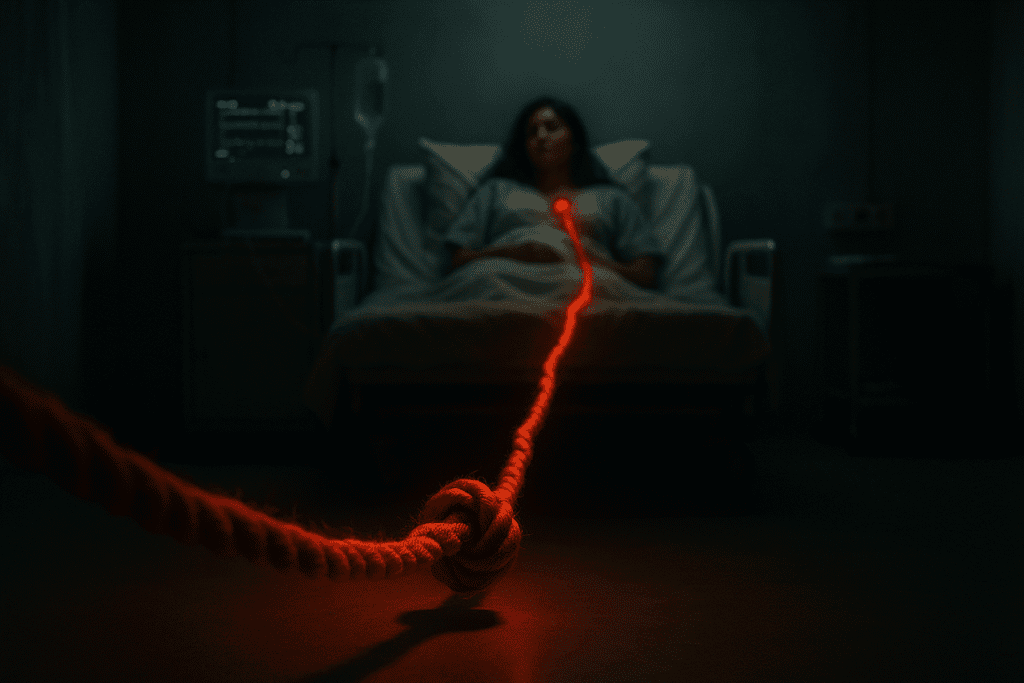
The hospital had long become an extension of our home. My mother had been admitted so often, it felt like the corridors knew my footsteps. The nurses, the doctors — they all recognized me. Some greeted me with tired smiles, others patted my shoulder. They’d ask how I was doing. I never knew whether they admired my courage or pitied the weight I carried.
There was almost always a vacant bed waiting in the same corner of the ward, as if it had memorized her shape.
I placed the breakfast on her bedside table. I glanced at her — I wasn’t sure if she was still unconscious or simply asleep. The blood-blotted bandages spoke louder than anything else. Her body, burned and broken. But I didn’t cry. I couldn’t afford to fall apart.
Those mornings had their own rhythm.
I cooked. I packed. I held my sister’s hand. I walked. I pretended I was fine.
The child who answered chaos like a calling. But somewhere along the way, I stopped being a child. Without knowing it, I had become a parentified child.
Wearing a role my small shoulders were never meant to hold. I had stepped into the skin of a caregiver and protector long before I even knew how to spell those words.
My father, though was there, carried scars of his own. Raised in a home where tenderness was buried under silence, he had no language for affection. I know now that he loved us — but his love came through responsibility, not warmth.
Now I know he could not bear the pain of the love of his life — my mother, falling apart right before his very eyes. And when the weight became unbearable, he turned to alcohol.
Some nights he came home.
Some nights, he didn’t.
My own chest held a storm — too young to name.
But love made me brave.
Not the kind of love that waits for ease — the kind that kneels in fire and still says:
“I will carry you home.”
Where love and pain, wore the same face
We had just returned from one of our bicycle rides — the kind that made the world feel wide and open, the kind that gave us a brief taste of what freedom must feel like. Lux sat nestled between my arms — her laughter weaving through the warm wind. The dirt road curved like a ribbon through the village, and with each bump and wobble, she would squeal with delight. We lived for those moments.
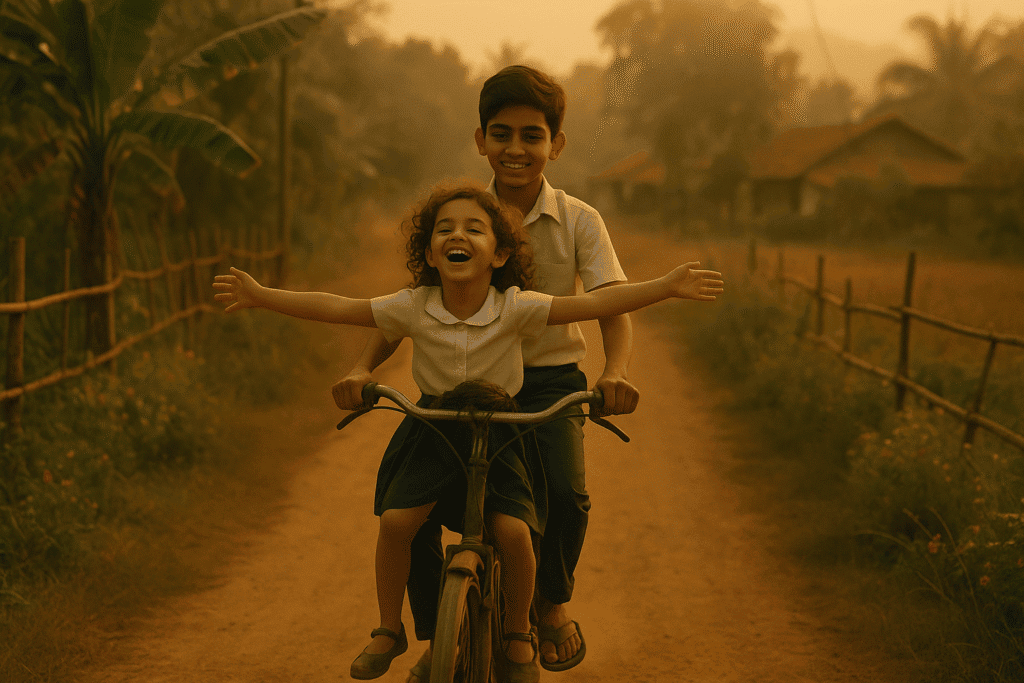
It made everything else — the benzene smell of the hospital wards, the long nights, the hidden pain and uncertainties — momentarily vanish.
But joy was a fragile thing in our home. It arrived like a guest we weren’t sure we were allowed to entertain for too long.
We parked the bike outside. Lux was still giggling, cheeks flushed, eyes radiant with life. And then — something shifted.
Our mother was sitting near the porch, her shoulders slouched, her breath shallow — the unmistakable aftermath of another painful treatment or internal breakdown. The house was tight with tension.
My mother — as the villagers said, a rare beauty of a woman — sometimes transformed in her darker states into someone unrecognizable. We could sense those changes from a mile away.
Lux and I immediately fell silent. The kind of stillness that prickles your skin before a storm arrives.
My mother was still young herself — in her mid-twenties — carrying, quite literally, a fragile heart and a fractured mind often flooded with fear. There were moments she lost control — not because she wished to harm us, but because she didn’t know how else to respond to the chaos that lived inside her. They came like unconscious monsters, then left behind remorse.
At the time, two distant relatives were staying with us temporarily. A couple who constantly teased Lux, mocked her, poked her with words wrapped in “just joking” — but always meant to sting. Little Lux — just five or six — earlier that day had spoken up to them again.
My sister, bold and unfiltered, refused to shrink. Her spirit was untamed — and I loved that about her.
But my mother saw it differently. The shame of not being able to control the narrative in front of others — the fear of failing as a mother — like zombies, followed her from room to room.
She had warned Lux before: if she embarrassed the adults again, there would be consequences.
This time, she followed through.
She dragged my sister to the yard, tied her to the pine tree in the middle of the garden — the child’s frangible hands pulled behind her back — then she stepped over to the side of the yard to pick a few raw green chilies.
With her own hands, she crushed the chilies and rubbed the fire across my sister’s mouth and cheeks.
I stood frozen. Again.
I can still recall the red patches fracturing across her face — like it’s happening right now.
She tried to silence the scream, to resist the cry that clawed its way up her throat. She didn’t beg. She didn’t plead. It was as if she had already learned that asking for mercy didn’t promise safety.
But her body eventually gave in.
She began to gasp — violently. Her lungs seized. She couldn’t breathe.
And even that — even the collapse of her little daughter — wasn’t enough to loosen the knot tangled inside my mother’s heart.
The pain, the buried trauma disguised as discipline, overpowered the motherly love — and, for that moment, it claimed the final victory.
I didn’t cry. I didn’t speak. I didn’t move. Because I simply couldn’t.
My love for my mother battled with the horror of her actions. My protective instinct for my sister clashed with the frozen helplessness in my chest.
Inside, I was screaming, falling apart. But I had been taught not to question. Not to cause trouble. Not to contribute to the unfolding chaos.
So I wished — with every bone in my body — that I could trade places with her. That if someone had to endure this pain, let it be me. And that was the only thing I could wrap my head around.
My body dissociated. The garden turned surreal, distant, like a nightmare I couldn’t wake from. Everything slowed down. It felt like reality had zoomed out — and I had floated into some realm just beyond it, watching it all happen through a veil.
The sun was beginning to set — a deep crimson bleeding into the sky — as if the sky too was mourning what it had just witnessed.
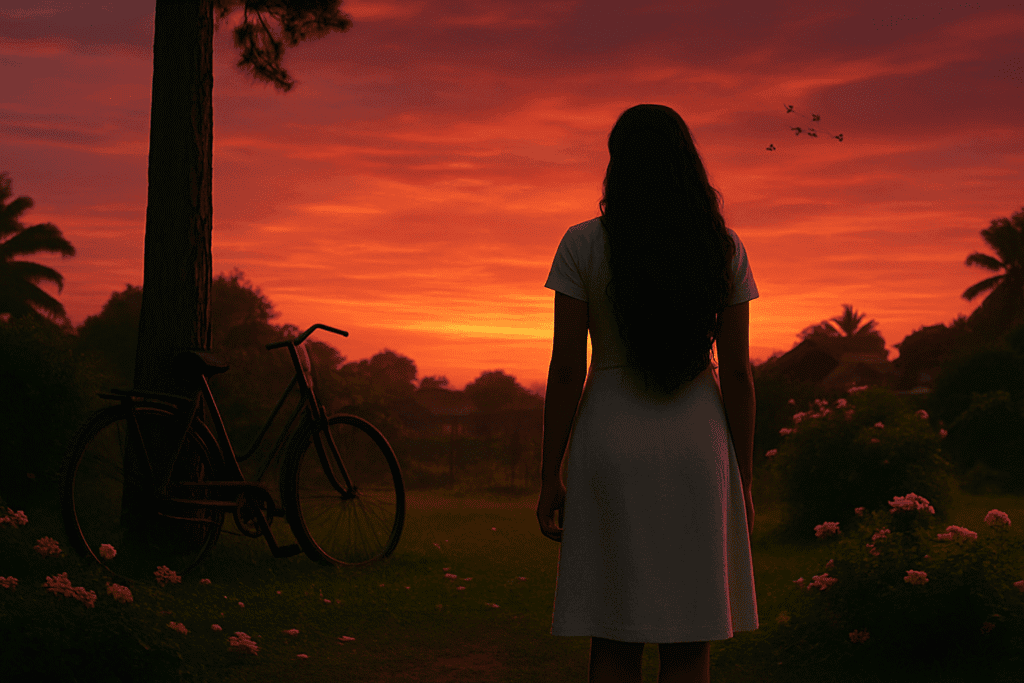
And that was the moment I learned:
In our house, love and pain lived side by side.
And sometimes, they wore the same face.
That night, I lay beside my sister in silence.
And when the house grew quiet, the tears I hadn’t shed spilled from my eyes, soaking my pillow. It was the only place I knew how to grieve — alone, in the dark, in silence.
And no one ever spoke of it again.
The invisible inherited knot continued to tighten through us
Sometimes, pain doesn’t begin with us.
It arrives through us — disguised as discipline, silence, or even love.
My mother didn’t mean to hurt us. She was carrying the scars of a childhood buried under fear, conformity, and the unspoken grief of her father’s unexpected suicide — followed by tragedies we will never fully know. Her nervous system — shaped by neglect, violence, instability, and shame — had learned to equate control with care.
When my mother is in her full senses, she is the kind of woman who would give her last dime to the one who needed it. She is the kind of soul who would go out of her way to comfort a suffering stranger or animal, or even a butterfly.
The struggles, sickness, and violence manifesting through her were unconscious trauma responses.
Now that I understand the intricacy of how trauma affects people, I recognize it as Post-Traumatic Stress Disorder (PTSD). In my mother’s case, it was even more convoluted — she had been exposed to endless, prolonged adversity and trauma. This made her condition Complex Post-Traumatic Stress Disorder (CPTSD) — a condition that requires deep mental, emotional, and somatic (body-focused) healing, with care and compassion.
Her attempts at discipline weren’t cruelty in her eyes.
They were survival rituals she had inherited — a twisted expression of love, distorted through generations of trauma.
It was the severe brokenness from her past, deeply imprinted in her nervous system, whispering in her ear and taking control over her emotion, thought, and action.
My poor mother thought it was a curse — and in a way, it was indeed.
Except now, I can explain it with science.
And all the more reason I love her deeply more than ever.
This is transgenerational trauma manifesting as CPTSD: the unconscious passing of pain, patterns, and emotional burdens through generations to the next.
The grief of my grandfather’s sudden death, the abandonment from the family of her father’s side, the poverty that followed, the guilt of not belonging, growing up in an unsafe environment as a blossoming girl with incomparable beauty — but no one to protect her — all of it crystallized into my mother’s fear, her volatility, and her compulsion to conform.
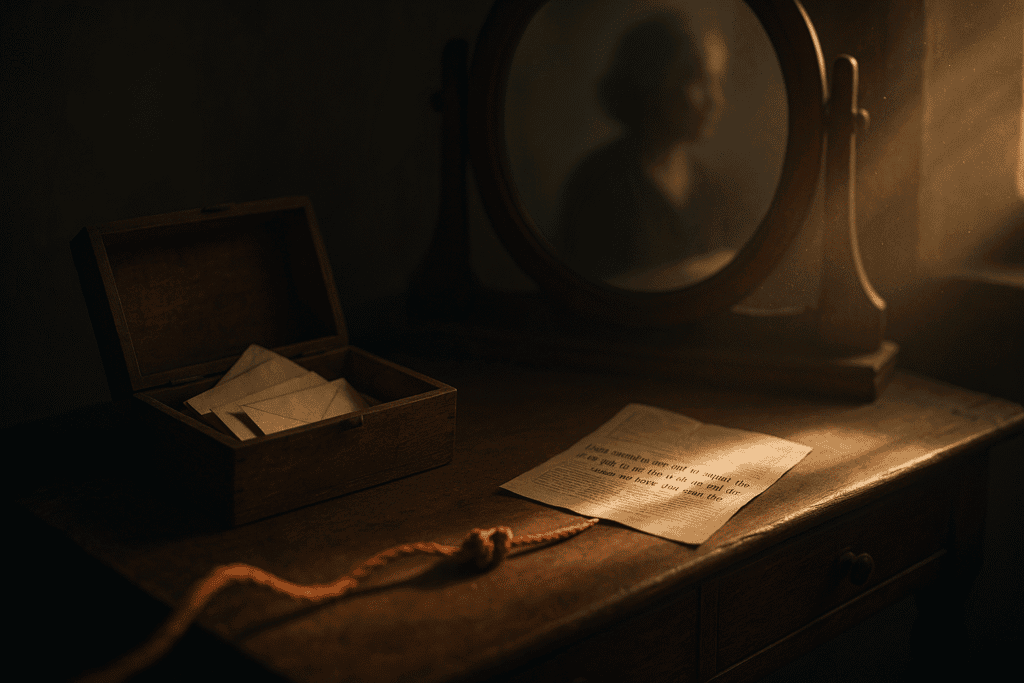
And we — my sister and I — became the inheritors of a legacy none of us consciously chose.
In the chaos, I became what psychologists call a parentified child — a child who grows up too quickly, not because of choice, but because of necessity. I took on the emotional and practical responsibilities of a parent long before I had the chance to be fully held as a child.
And that kind of premature caretaking — though praised by the world as maturity — is, in truth, a response to unmet needs.
A coping mechanism forged in fire.
My sister, on the other hand, carried a different wound.
The price of her truth-telling, her defiance, her unfiltered innocence — was met with punishment.
Her spirit clashed with the inherited shadows of obedience.
Though our family looked intact, my sister quietly began to endure the pain of chronic abandonment at such a young age.
The cycle repeated itself.
Until we broke it. Not with violence or destruction, but with awareness, devoted healing-intervention and love.
If you’re too — yearning for love,
Then let the pain break you open.
The deeper the wound,
the greater your depth.
Heartache is not the opposite of love,
it is the doorway.
Like a wildflower bloom in places that never imagined was possible
Today, my sister is a woman of remarkable grace.
A specialist in child, adolescent development and parenting, she has devoted her life to tending to the developmental needs of children — not just as a profession, but from the depth of someone who once bore pain no child should carry.
She became the very safety she never had.
Who would’ve imagined that the same girl — once tied to a tree, chilies burning across her face — would rise to teach parents how to love more wisely, more gently?
But she did.
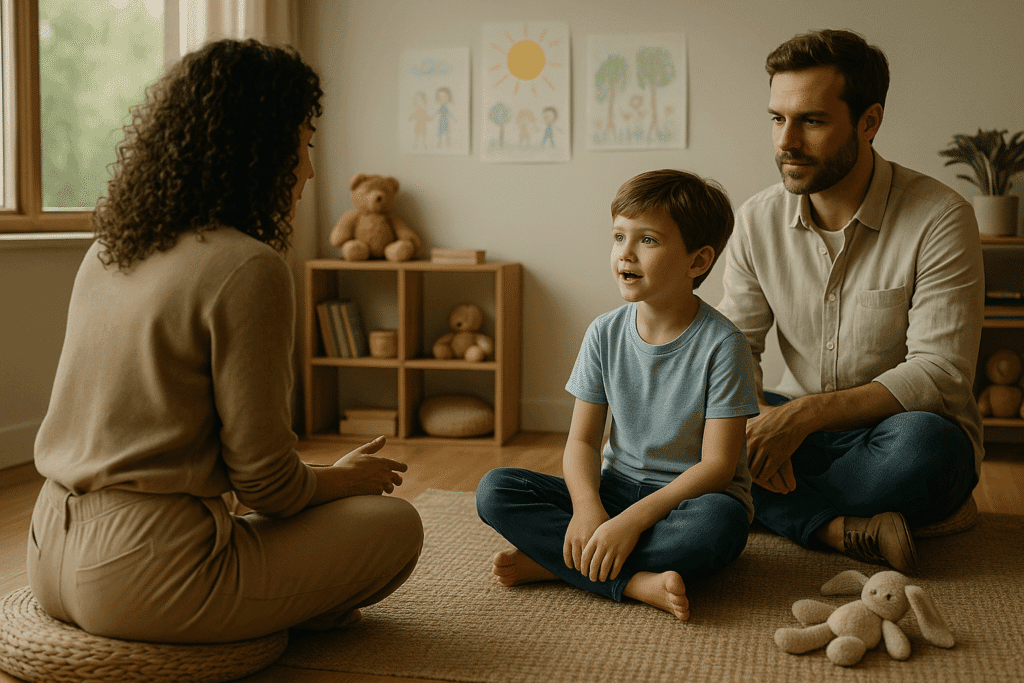
As she often says — like a wildflower bloom in places that never imagined was possible.
And I, the boy who once walked hospital floors carrying the breakfast cooked before school, now walk those same corridors as a psychologist — accompanying trauma-impacted people through their healing journeys, holding space for similar pain that once broke him.
We each found our path to healing.
And perhaps the most sacred truth we’ve learned is this:
Healing becomes whole not when it ends with you — but when you extend it forward, even to those who once caused you pain.
We have forgiven our parents and their past, their parents, and our ancestors.
Not because the pain didn’t matter — but because we came to understand the weight they were carrying too.
The pain they never spoke of.
The trauma they never named.
The brokenness they inherited without choosing.
They were once children too, raised in worlds that didn’t know how to love them properly.
And so, we chose to do differently.
What began as a bike ride down dusty village roads has turned into long journeys of road trips now — my sister in the passenger seat, music playing softly, our voices carrying memories and laughter into the wind.
We talk for hours, in between long silences.

We celebrate not just freedom, but the light of our friendship — the profound love of siblings.
Our parents join us sometimes.
We travel together, to distant corners of the world.
We share exotic delicacies, laugh until we cry, and even meditate together.
So, we heal together.
We create new memories, tenderly layering them over the old ones — like fresh petals on wounded soil.
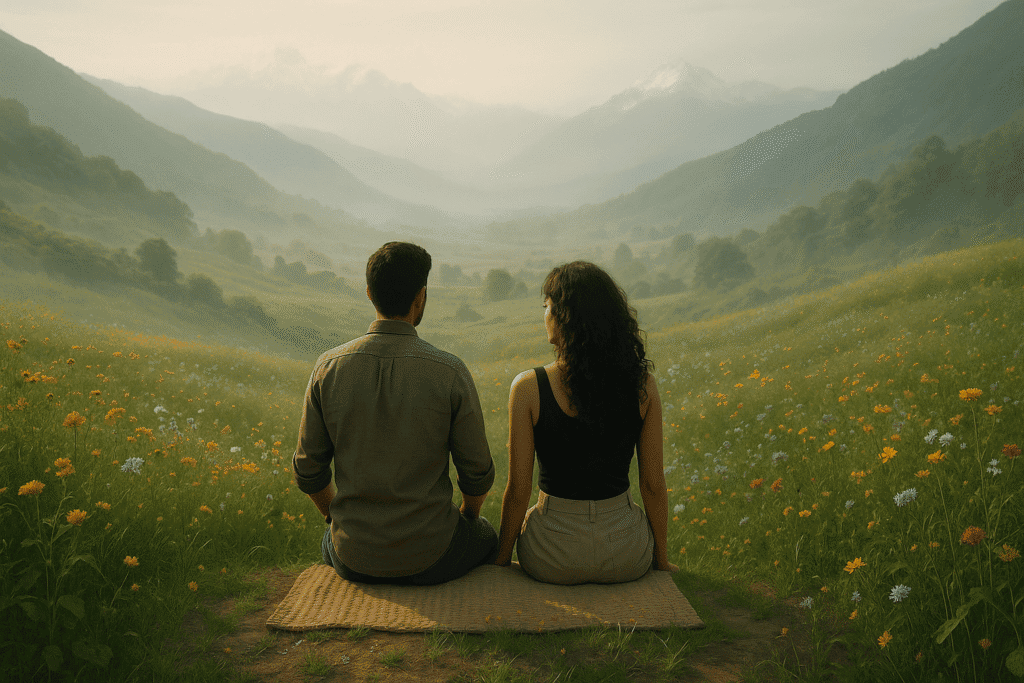
A new flora is growing over the dead and buried past.
And the flowers are blossoming in the soft colors.
Because when you choose to name and grow beyond the aftermath of trauma — you don’t just survive.
You learn to heal yourself, your ancestors, and the unborn generations.
This is how it sometimes arrives — in broken families,
and between siblings.
Not as warmth, but as struggle.
Not as comfort, but as survival.
And yet, all along — it was only wearing the face it knew.
Waiting to be seen, named, and healed.
Mended back to its purest form:
Unconditional love.
And if you’re lucky enough to do it together — you remember:
Even the most broken roots can still grow a garden.
If this chapter brought someone to mind — someone who walked through pain too early, who became strong too soon — consider sharing it with them. Someone who might have mistaken survival for strength, or grown so used to giving love that they forgot they were worthy of receiving it too.
And if these words touched a quiet place inside you — a memory, a longing, or a tenderness still seeking language — I would be honored to hear your reflection. Feel free to share in the comments below.
Sometimes, your truth — gently spoken — becomes a balm for another. The mirror someone else needs to remember that even the most broken beginnings can blossom into love.
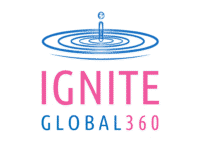
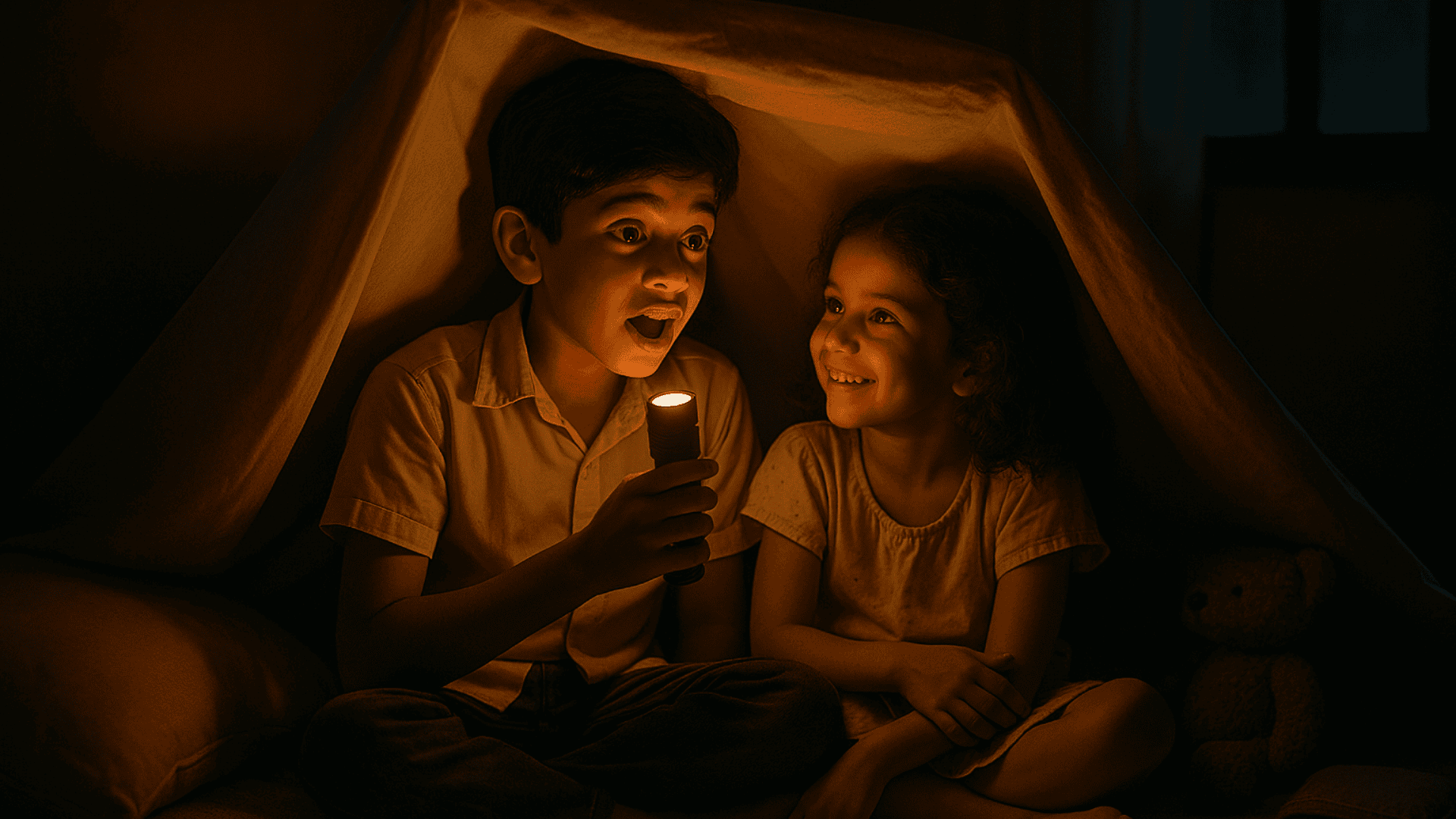
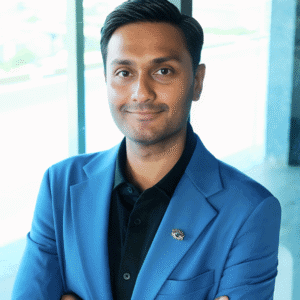

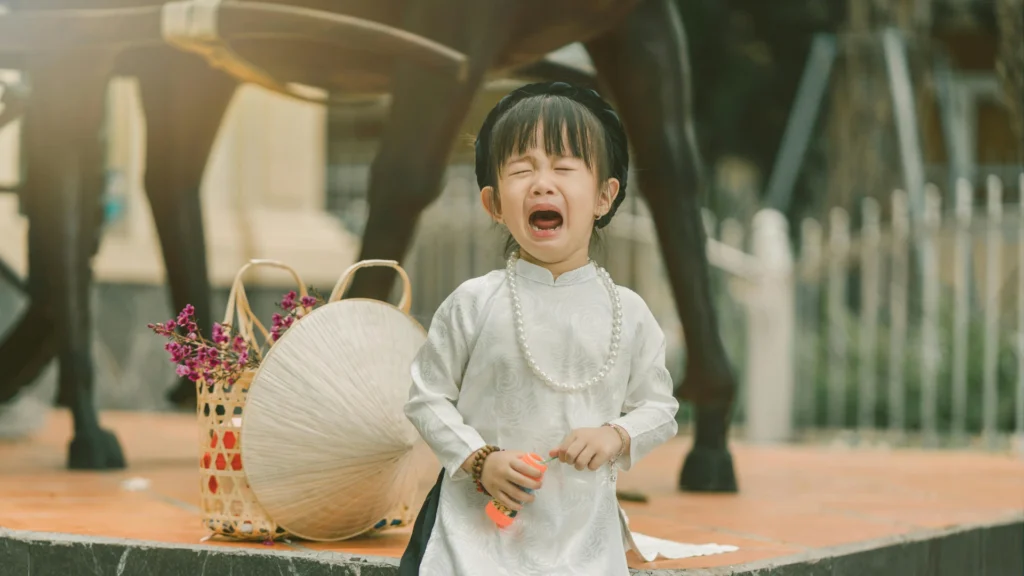
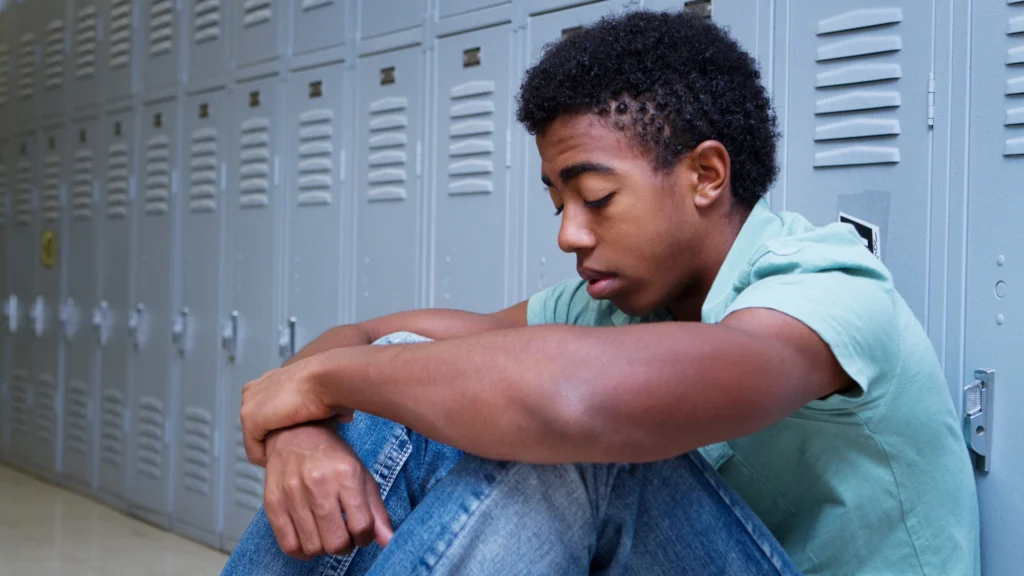
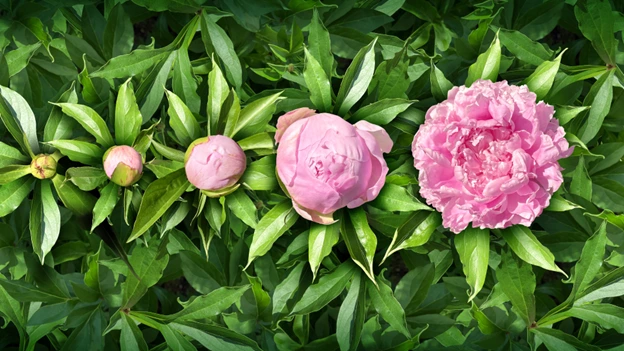
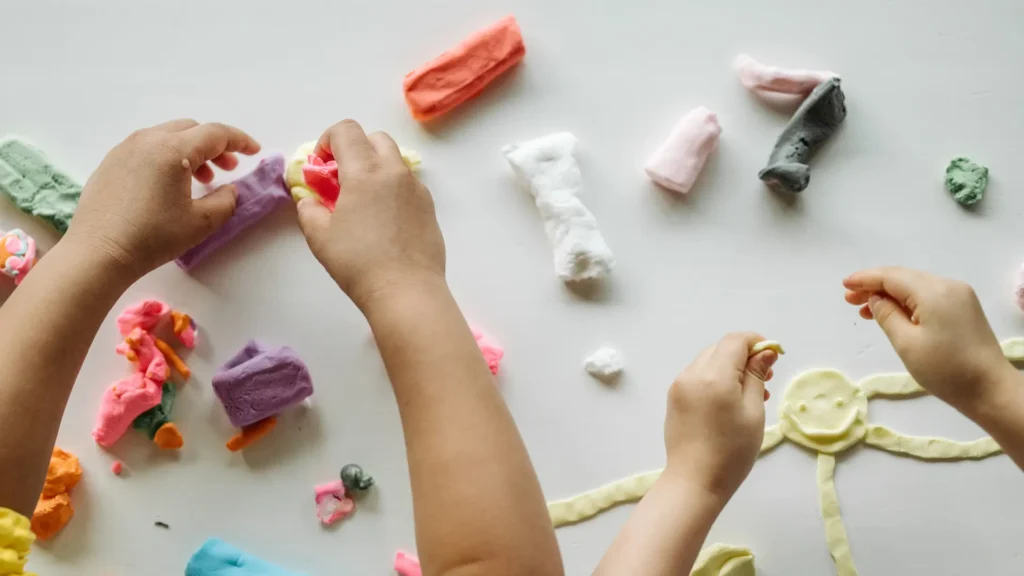
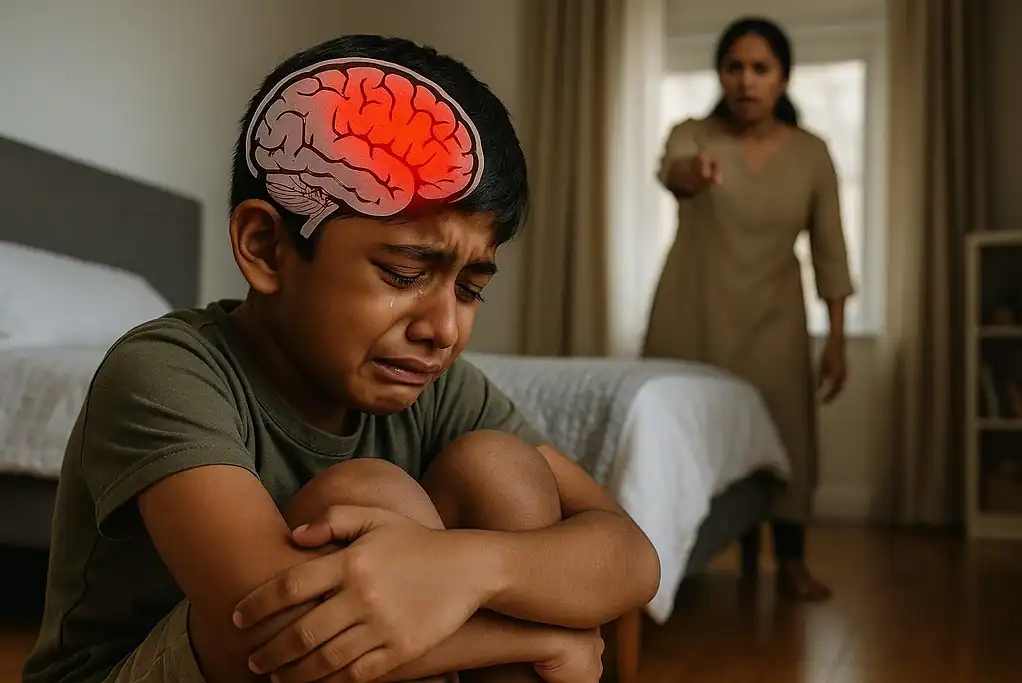
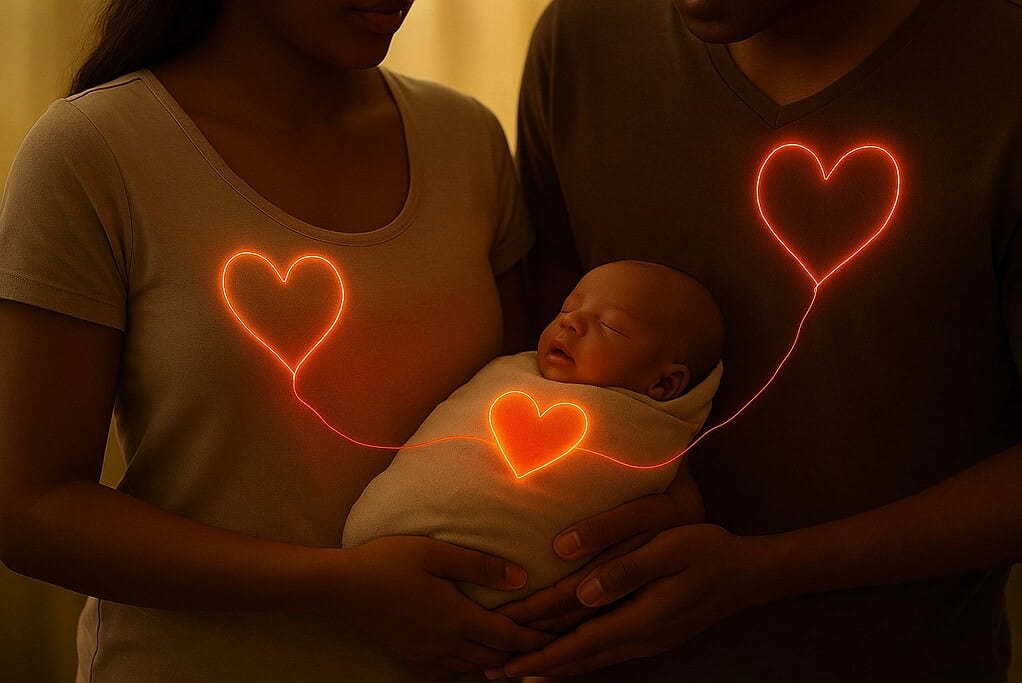
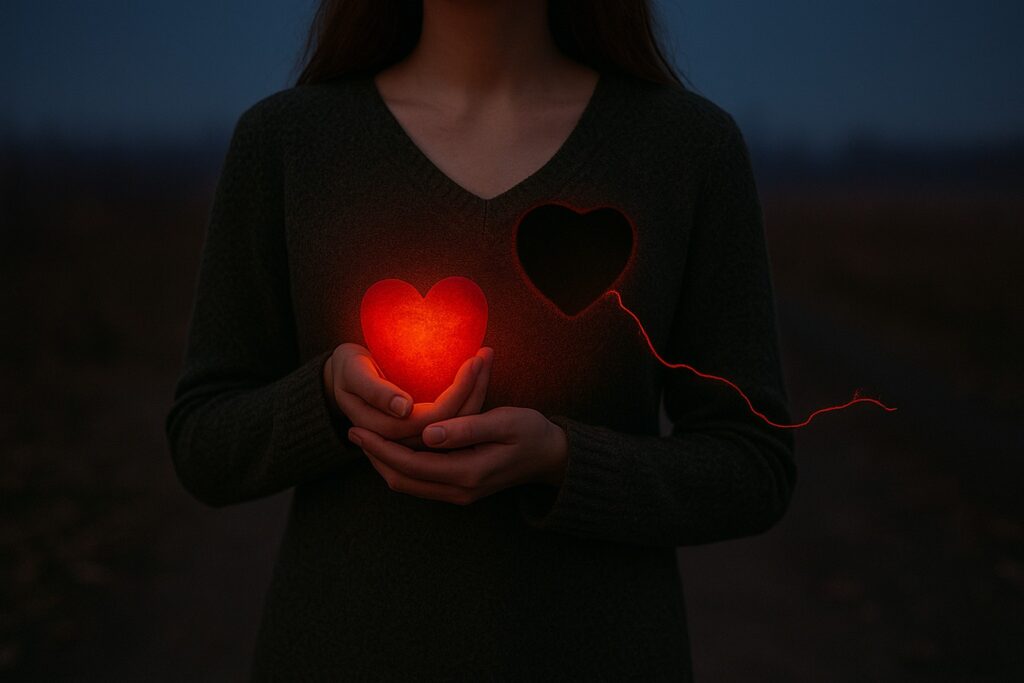
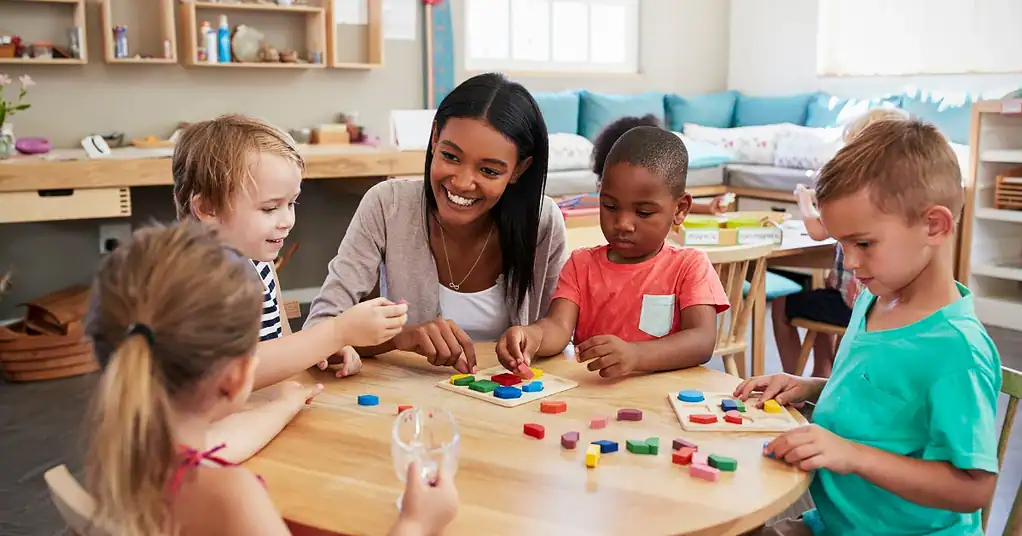
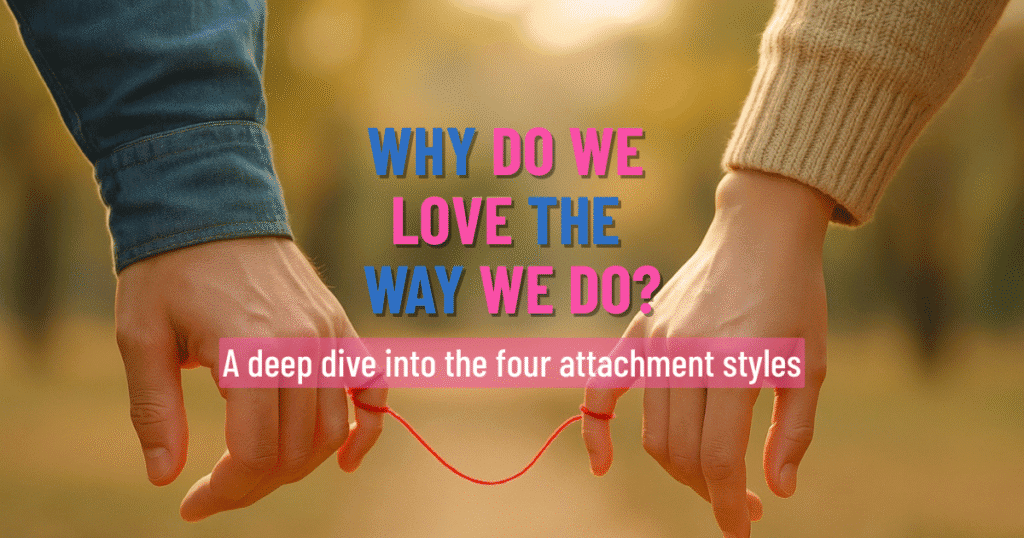
Thank you for being so transparent with this autobography, sharing your heart here in this incredible account of your early years & the upbringing. I think it’s admirable how you’ve both come such a long way to be the resilient, graceful and compassionate souls that you are. From the ashes of defeat the phoenix rises, and it’s from the darkest places when our souls have been squeezed so hard, that we are stretched and in fact propelled directly into our soul’s highest purpose — the fulfilment of our divine destiny! I am in awe and humbled by the strength & wisdom I see here here in your contemplative reflection.
Thank you, Debbie. Your words touched me deeply. It means the world to have this story received with such grace and reverence. Yes — it’s in the darkest places we often find the divine light. I’m humbled and grateful to walk this path, and even more so to share it with those who truly see. Thank you for witnessing. Sending you my best!
Thank you Fernando for sharing. I agree with every word Debbie wrote so beautifully. “It’s from the darkest places that we are propelled to our soul’s highest purpose.” Grateful for the work you and your sister do in this world. Reading your story felt like a balm on the wounds of my own childhood. Thank you from the heart.
Thank you Maika for your beautiful message. I’m deeply moved that the story could touch something gentle in you — like a balm, as we both resonate. That is exactly why I write. I’m grateful to walk this path of healing and remembrance alongside beautiful souls like you, Debbie and many. Sending you my best energy!